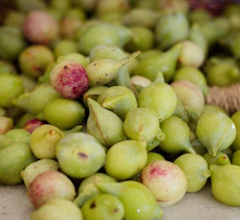Kakadu Plum
 Kakadu Plum (Terminalia ferdinandiana) is a fruit of a tree native to Australia and has a sour flavour. Indigenous Australians have consumed this fruit for thousands of years and Kakadu Plum has been an essential part of the indigenous diet.1
Kakadu Plum (Terminalia ferdinandiana) is a fruit of a tree native to Australia and has a sour flavour. Indigenous Australians have consumed this fruit for thousands of years and Kakadu Plum has been an essential part of the indigenous diet.1
It gained global popularity when researchers found that it has the highest Vitamin C content among all commonly consumed fruits. It is also a good source of nutrition, rich in antioxidants and minerals including calcium, magnesium, and phosphorus.1
Health Benefits of Kakadu Plum
Below are some of the well-known health benefits of Kakadu Plum:
- The Richest Source of Natural Vitamin C
When it comes to the content of Vitamin C, nothing in the world compares to Kakadu Plum. A 100 grams of fruit pulp has a whopping 7000 mg of Vitamin C, which is 100 times more than that found in one orange. For most adults, 100 mg a day of Vitamin C is adequate, and this fruit has it in high therapeutic doses.1
At such high doses, Vitamin C can help to:
- Potent Antioxidant
Kakadu Plum is considered among the most potent antioxidants. Its antioxidant capacity is estimated to be several times greater than the levels found in blackberries. This is not only due to high levels of Vitamin C but also due to its high content of ellagic acid. Studies show that 100 grams of Kakadu Plum have enough ellagic acid to meet the daily need for antioxidants. Ellagic acid has received a high level of attention due to its ability to reduce cancer risk and increase survivability in those affected by cancer. In addition, ellagic acid has be found to inhibit the growth of tumour cells and reduces inflammation.3,4 Kakadu Plum is also rich in phenolic compounds, with the levels found in Kakadu Plum being much higher than found in most known berries.5
- Cancer Prevention
Thanks to its high content of Vitamin C, phenolic compounds and ellagic acid, consumption of Kakadu Plum may exert potent cancer-preventing action. It may help prevent various cancers, however, there is still a need for further research into this area.4 - Anti-Aging
Kakadu Plum is so abundant in antioxidants and therefore naturally prevents age-related decline in general health and can also help to prevent chronic diseases. Additionally, studies show that Kakadu Plum could be beneficial for skin health whether consumed orally or applied locally.6
Side Effects of Kakadu Plum
Though it is the richest source of natural Vitamin C, it also means that its prolonged use increases the risk of hypervitaminosis. In addition, most studies suggest that the tolerable upper limit of Vitamin C is 2,000 mg per day, whereas 100 grams of Kakadu Plum may contain up to 7,000 mg of Vitamin C. Therefore, it is advised to consume Kakadu Plum in small quantities.3
Additionally, Kakadu Plum is also rich in oxalic acid which is closely related to ascorbic acid and not considered to be a positive acid to intake. A high dietary intake of oxalates considerably increases the risk of kidney stones. This means that some high-risk individuals should only consume Kakadu Plum in small amounts and only intermittently.3
Properties
- Anti-Aging3,4
- Antioxidant1,2,6
- Cancer Prevention4
- Energiser1
- Eye Health1,2
- Heart Support / Health1,2
- High/Good Levels of Calcium1
- High/Good Levels of Magnesium1
- High/Good Levels of Phosphorous1
- High/Good Levels of Vitamin C1
- Immune Booster1
- Oxidation Reduction1,5
- Skin Issues6
References:
- Kakadu Plum | Australian Native Food and Botanicals. Accessed September 14, 2021.
- Office of Dietary Supplements - Vitamin C. Accessed September 14, 2021.
- Williams DJ, Edwards D, Pun S, et al. Organic acids in Kakadu plum (Terminalia ferdinandiana): The good (ellagic), the bad (oxalic) and the uncertain (ascorbic). Food Res Int. 2016;89:237-244. doi:10.1016/j.foodres.2016.08.004
- Zhang H-M, Zhao L, Li H, Xu H, Chen W-W, Tao L. Research progress on the anticarcinogenic actions and mechanisms of ellagic acid. Cancer Biol Med. 2014;11(2):92-100. doi:10.7497/j.issn.2095-3941.2014.02.004
- Netzel M, Netzel G, Tian Q, Schwartz S, Konczak I. Native Australian fruits — a novel source of antioxidants for food. Innov Food Sci Emerg Technol. 2007;8(3):339-346. doi:10.1016/j.ifset.2007.03.007
- Emy S, Iswari IS, Winarti NW. Terminalia ferdinandiana inhibited the increased of matrix metalloproteinase-1 and prevent collagen decreased in mice skin exposed to UV-B. Neurol Spinale Medico Chir. 2021;4(1):11-14. doi:10.36444/nsmc.v4i1.136
